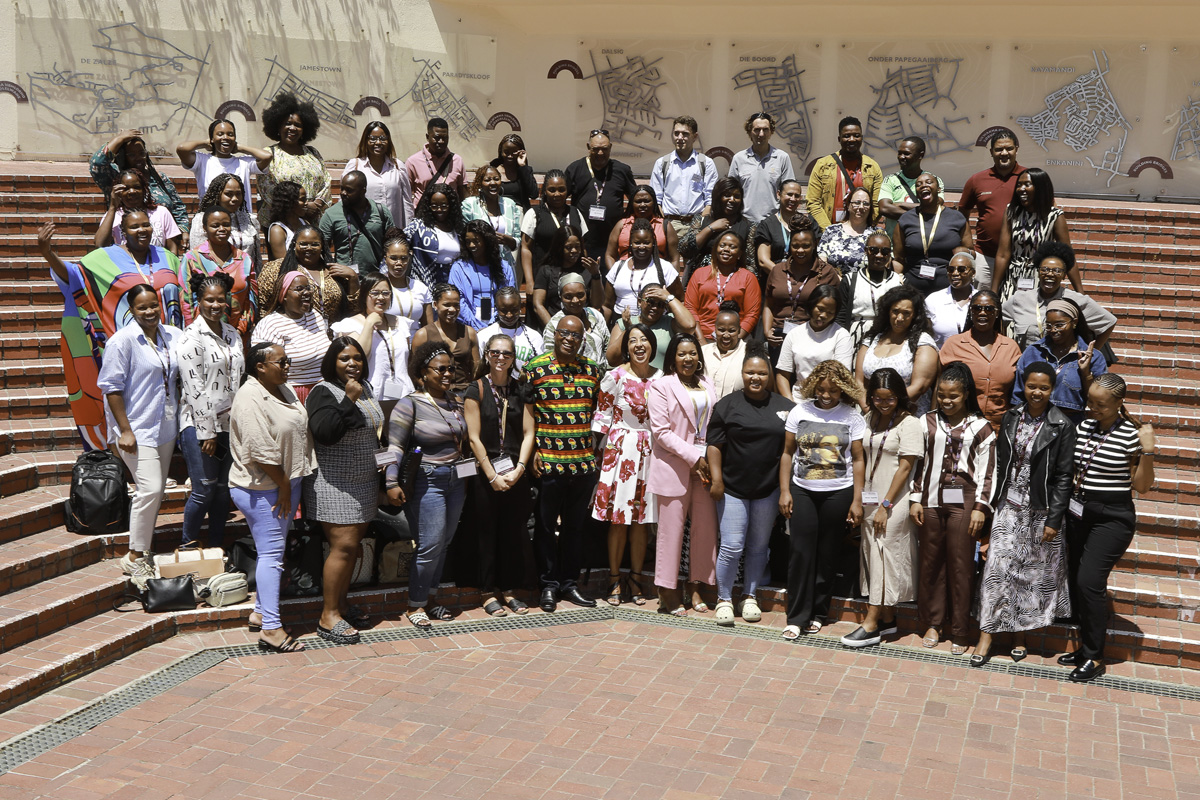Postgraduate diploma in HIV/Aids Management

Summer school 2026
Welcome to this year’s PgDip cohort!
Dates: Monday 2 February – Friday 6 February 2026
Venue: Room 1013, Jan Mouton Learning Centre (De Beer Road, Stellenbosch campus)
Download the full programme here.
Programme description
The PgDip (HIV/Aids Management) is a one-year programme presented through hybrid learning. It includes a summer and winter school in Stellenbosch as well as interactive online sessions during the year and is offered in English. The diploma consists of six compulsory modules (20 credits each) and makes use of continuous assessment by means of individual written assignments and online quizzes. Students must pass all six modules to obtain the necessary 120 credits.

PgDip in HIV/Aids Management
Programme outcomes
After successfully completing the diploma, students will have the knowledge and competencies to deal with the challenges and opportunities around managing all facets of HIV and Aids in the world of work.

Programme content
Module 1
To lay the foundation for the programme, the first module provides a comprehensive, global view of the central aspects of the HIV/Aids epidemic.
The epidemiology of HIV
- The occurrence, distribution and control of HIV as the basis of monitoring and ending the epidemic
- Global and Sub-Saharan African statistics and trends
- Transmission and risk factors
- How the virus causes disease
- Diagnosis and testing methodologies
- Prevention interventions and treatment
- Insights from surveillance and demographic modelling
The macroeconomic and socioeconomic impact of HIV/Aids
- How HIV/Aids affects the economic performance of a country or region, social welfare and the workforce
- Employers’ perceptions and challenges
- The required response
The reciprocal cycle between HIV/Aids, migration and poverty
- The role of migration and poverty in producing, sustaining and exacerbating vulnerability to HIV
- Poverty as a multidimensional condition of life (i.e. beyond a lack of money)
- Different forms of migration and migratory streams
- Current trends, controversies and the social challenges of HIV relating to the behavioural element
Module 2
The second module explores some of the key non-health factors that play an important role in the HIV/Aids epidemic.
HIV and stigma
- Factors that drive stigma
- Different types of stigma
- The negative impact of stigma on health programmes, communities and individuals
- How to formulate strategies to mitigate stigma (including tools to monitor and evaluate efforts)
- The role of faith-based organisations in the response
Sexuality & gender inequality
- Gender as a health determinant and a vulnerability, especially in the context of how gender can contribute to HIV risks
- The relationship between gender and sexuality in the context of social relations
- Activities and actions in the workplace that can address gender inequalities and HIV risks
The role of culture in the HIV/Aids epidemic
- The relationship between HIV/Aids and culture, as a driver of how we operate as communities and a society
- Cultural practices that increase the risk of HIV infection
- The implications of cultural beliefs and values for HIV prevention and treatment and the HIV response in general
Module 3
Module 3 investigates the requirements and practicalities of an effective HIV/Aids response at a community level and in the world of work.
Community organisation and mobilisation for social justice advocacy
- Societal problems relating to HIV/Aids (as a social justice issue) and the implication for HIV programmes
- Different approaches to community organisation and mobilisation
- How to design comprehensive interventions to address HIV/Aids-related social problems
Designing and developing an HIV policy
- The function of an HIV/Aids policy
- Laws, guidelines and principles that guide the development of such a policy
- The process of developing a policy (e.g. tools and strategies)
- How to navigate challenges
Legal framework and organisational practices regarding employment of workers with HIV/Aids
- International, regional and national laws pertaining to the constitutional and legislative protection of employees living with HIV
- Legal implications for airborne epidemics such as TB and Covid-19 in the world of work
Module 4
The units in the fourth module focus on various aspects related to prevention and care for people living with HIV/Aids.
Strategies for HIV prevention
- The history and challenges of HIV prevention in specific contexts
- Combination strategies and their advantages over single strategies
- How a behavioural, biometrical and structural approach can be used as a combination strategy
Therapeutic management of HIV ─ adherence
- Differences between compliance, adherence and concordance
- The scope and drivers of non-adherence
- Strategies healthcare providers can use to encourage adherence
- Monitoring and evaluation methods in the context of the limitations of HIV medication adherence strategies
Pharmacovigilance in HIV and Aids ─ adverse drug reactions and monitoring
- The importance of pharmacovigilance to treatment
- The scope of the challenge and current methods of carrying out pharmacovigilance in the context of HIV/Aids treatment
- Common serious adverse drug reactions associated with antiretroviral therapy
- Major organs and body systems associated with medication toxicity and the accompanying signs and symptoms
Mental health and wellbeing
- Understanding and managing personal mental health and wellbeing
- Support and increase mental health and wellbeing in the workplace
- Explore mental health and HIV risk and vulnerability
- Mental health-related stigma and discrimination
- Strategies to eliminate mental health-related stigma and discrimination
Module 5
Module 5 turns to business perspectives and investigates management in the era of HIV and Aids, in contexts such as strategic human resource management, corporate social responsibility as well as ethics and leadership.
A business perspective on the HIV/Aids epidemic ─ strategic HR management (HRM)
- Differences between strategic and traditional approaches to HRM
- Key HRM functions and how job design influences employee motivation and performance
- External and internal recruitment methods and the HR department’s role in selection
- Concepts surrounding training and development as well as the difference between performance management and appraisal
- Essentials for an effective employee assistance programme
- The impact of HIV/Aids on the workplace
- Virtual workplace arrangements
Corporate social responsibility (CSR) of organisations
- CSR theory and practice in the context of companies reshaping themselves towards being part of a broader goal to do good for the community
- CSR and the plight of HIV/Aids in Africa
- Relevant developments and trends in South Africa and the rest of Africa
Ethics and leadership in HIV/Aids management
- Ethics, leadership and ethical leadership in managing HIV/Aids, including the key principles of ethics and the tenets of ethical leadership
- Pressing sociopolitical and ethical challenges and complexities surrounding HIV/Aids in Africa, related moral dilemmas and competing values that play a role in people’s assessment of these problems.
- Personal reflections on students’ ethical leadership practice and ways and means to address associated challenges
Module 6
Research is part and parcel of academic work and in Module 6 different methodologies are explained, whereafter students find out how to monitor and evaluate HIV/Aids programmes.
Qualitative research methodology
- The concept of qualitative research and different approaches to it
- The critical, qualitative paradigm and its philosophical grounding
- Formulating a problem statement and research question
- Creating an appropriate qualitative research methodology and design (practical)
Quantitative research methodology
- Identifying a contextual researchable topic and formulating a problem statement or research question
- Measurement and analysis fundamentals
- Creating an appropriate research design and classifying and comparing various sampling methods and data collection methods (practical)
Programme monitoring and evaluation
- The key facets, steps and terminology of programme evaluation
- Engage critically with various evaluation approaches
- Differences between a theory of change and a basic programme logic model
- Develop robust project monitoring indicators and designing a monitoring and evaluation plan
Admission requirements
- Any bachelor’s degree, national higher diploma or equivalent (NQF level 7)
- Appropriate managerial experience
- Computer skills (MS Word, internet and email)
Please note: Meeting the admission requirements does not guarantee selection.
Selection
A limited number of students are accepted on the basis of academic performance.
Closing date
30 November of the year before your prospective studies.
Postgraduate funding
Need funding for your studies?
The SU Postgraduate Office offers various funding opportunities for postgraduate students at the university, and for this applicants/students should apply directly with the relevant office.
Find out more about applying and becoming an Africa Centre student
For more information about the application process and studying with us, visit our study FAQs page.




